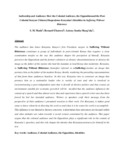Authorship and Audience: How the Colonial Audience, the Oppositionand the PostColonial Kenyan CitizenryShapesJomo Kenyatta’s Identities in Suffering Without Bitterness
Abstract
The audience that Jomo Kenyatta, Kenya’s first President, targets in Suffering Without
Bitterness constitutes a group of individuals in post-colonial Kenya that requires a close
examination insofar as the way this audience shapes his perception of himself. Kenyatta
perceives the Opposition and the former colonisers as threats whoseintentionwas to destroy his
image as the father of the nation who had the mandate to lead Kenya into modernity. Kenyatta,
in Suffering Without Bitterness (hereafter referred to asSuffering),invokes an image that
portrays him as the father of the modern Kenya, thereby rendering the prevailing representations
of him from these audiences baseless. In this text, Kenyatta tries to construct an image that
portrays him as a nationalist leader who is worthy of trust and who is involved in
(re)constructing a post-independent state that is devoid of divisive politics and that creates an
environment suitable for economic growth.It will be recalled that the audience influences the
content of a speech and that almost every idea and experience that a speech writer uses has been
forced by his/ her intended audience. Writers or speakers craft their message from the
perspective of their audience’s presumed reaction to their work. For Kenyatta, it makes good
sense to know whom he is directing his work to and what it is he wants his work to accomplish.
This influence is not limited to literary concerns; it determines how utterances are located within
and what attitudes are taken towards a social context constituted by the audience. This paper
argues that the colonial audience and the Opposition plays a significant role in the content of
Kenyatta’s speeches, and this role shapes the identity that Kenyattaconstructs for himself in his
text.

